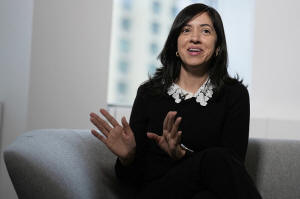Researchers in limbo as Columbia bows to Trump’s demands in bid to
restore $400M federal funding cut
[March 26, 2025]
By PHILIP MARCELO
NEW YORK (AP) — When President Donald Trump canceled $400 million in
funding to Columbia University over its handling of student protests
against Israel's war in Gaza, much of the financial pain fell on
researchers a train ride away from the school's campus, working on
things like curing cancer and studying COVID-19's impact on children.
The urgency of salvaging ongoing research projects at the university's
labs and world-renowned medical center was one factor in Columbia's
decision last week to bow to the Republican administration’s
unprecedented demands for changes in university policy as a condition of
getting funding restored.
The Ivy League university announced Friday that it would overhaul its
student disciplinary process, ban protesters from wearing masks, bar
demonstrations from academic buildings, adopt a new definition of
antisemitism and put its Middle Eastern studies program under the
supervision of a vice provost who would have a say over curriculum and
hiring.
The university's decision to accede to nearly all of the Trump
administration's demands outraged some faculty members, who say Columbia
has sacrificed academic freedom. The American Association of University
Professors and the American Federation of Teachers, representing members
of Columbia’s faculty, filed a lawsuit Tuesday saying the funding
revocation violated free speech laws.
Scientific and medical researchers are appalled that their work was
drawn into the debate to begin with.

“There’s simply no justifiable link for the federal government to put
this kind of research in the line of fire for the goal of mitigating
antisemitism at a different location," Dr. Dani Dumitriu, a pediatric
researcher studying babies born during the COVID-19 pandemic, said from
her office in midtown Manhattan.
Dr. Andrew Lassman, a brain cancer specialist and associate director of
clinical trials at Columbia's cancer center, said researchers will have
to make difficult decisions if the cuts stand. Those choices could
include prioritizing which experimental cancer treatments they will
focus on and how many patients they can treat, he said.
“This is real, not theoretical research,” said Lassman, who works at
Columbia University Irving Medical Center, located about 2.5 miles (4
kilometers) north of the university’s main campus. “Young, old, Black
white, Republican, Democrat — cancer doesn’t care.”
U.S. Education Secretary Linda McMahon said the university was “ on the
right track ” after it announced the changes Friday, but hasn't
indicated yet whether funding might be restored.
Columbia's interim president, Katrina Armstrong, on Tuesday
characterized the school's policy changes as “ right for Columbia.”
“Implementation of these measures is fundamental to sustaining our
academic mission without disruption and ensuring the safety of
Columbia’s students and campuses,” she said in a statement, adding that
she was committed to restoring the partnership between the university
and the federal government.
[to top of second column]
|

Casandra Almonte speaks to reporters in New York, Thursday, March
20, 2025. (AP Photo/Seth Wenig)
 On Columbia’s main campus, Benjamin
Bostick, an environmental scientist whose research on rural water
quality in Arizona, Oklahoma and the Dakotas was among those that
lost funding, expressed dismay at the university’s decision to agree
to the Trump administration's demands.
He said the school was put into a position where it couldn't do much
to fight back. “But I really dislike that it effectively divides the
institution and diverts attention from the fact that research
activities are being suspended by external powers," Bostick said.
“From my perspective, what the government is telling me is that they
don’t care about people who have these issues or how to address
them," he said, referring to the water quality research.
At Columbia's Teachers College, the cuts hit a program that trains
graduate students to become teachers for the deaf and hard of
hearing. Elaine Smolen, the program's co-director, said the
Department of Education grant provided students with tuition
support, living expenses and professional development.
“There’s no arguing with the extreme shortage and need for the kind
of work that we do,” she said. “The longer deaf or hard of hearing
children wait for services, the worse their outcomes are.”
At Dumitriu's office, the funding cuts have forced her team to stop
conducting and analyzing brain scans on participants in the study,
which sought to track the long-term health of children whose mothers
contracted COVID-19 while they were pregnant.
“We were learning so much, and we were hoping to continue to follow
up with these babies all the way into their adulthood,” she said.
Casandra Almonte, a New Jersey mom participating in the study with
her son, said pulling funding “makes no sense at all.”
She said the extra testing and periodic check-ins with Dumitriu’s
team gave her peace of mind that her son Oliver, now age 2, was
developing properly.
“It’s completely unfair to pull funding from science because people
are practicing free speech,” Almonte said.

For now, Dumitriu says much of her team’s work can continue using
other funding, as the National Institutes of Health grant suspended
by the Trump administration represented roughly a quarter of its
budget. She hopes to appeal the decision while her office seeks
other grants.
“We are kind of living moment to moment,” Dumitriu said. “It’s a
really rough time to want to do good.”
All contents © copyright 2025 Associated Press. All rights reserved |